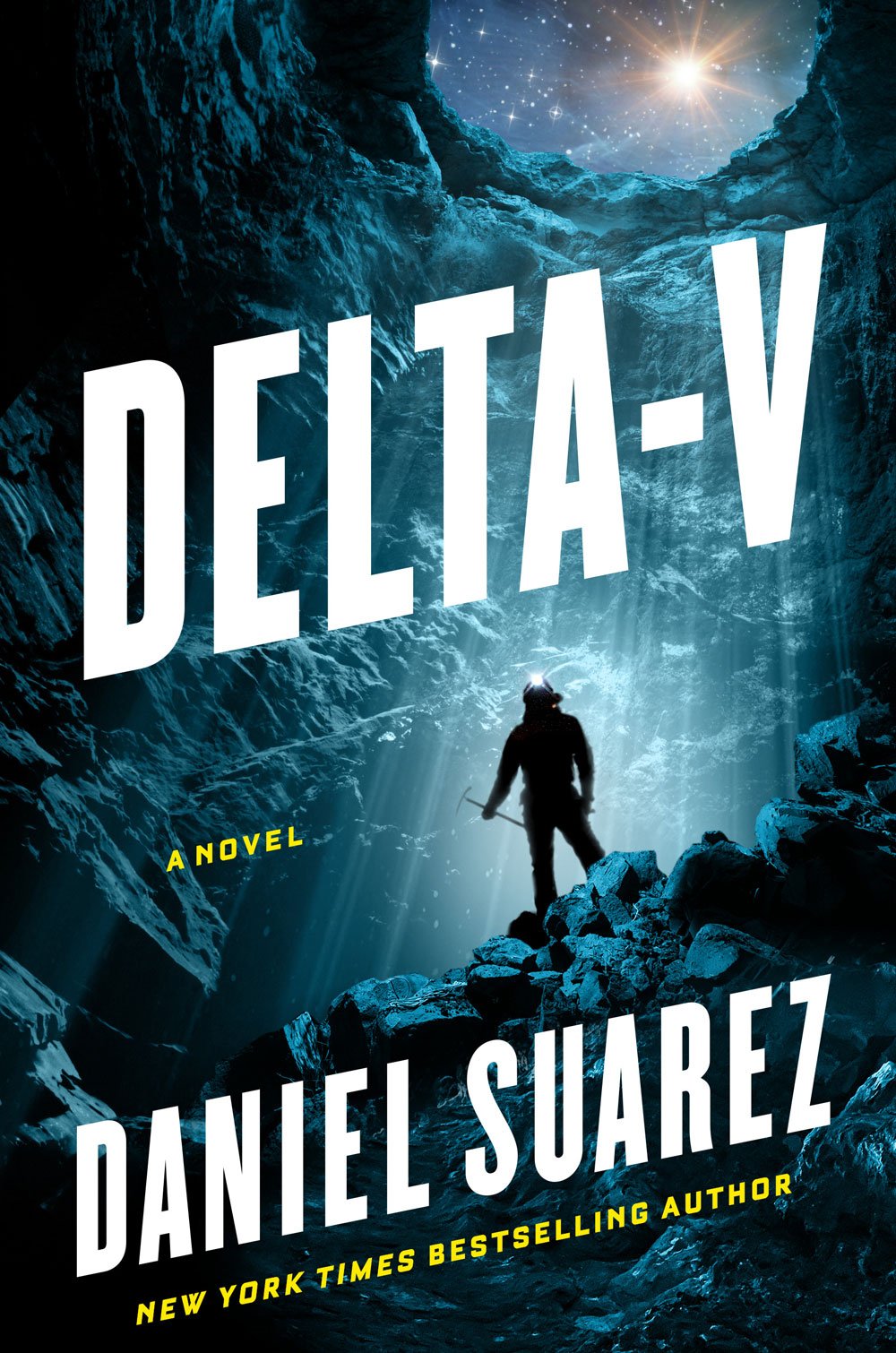
Delta-v by Daniel Suarez is a new novel about the exploration of our Solar System. It’s been a popular topic in recent years, but Suarez does put a unique spin on it. This is the first sci-fi story I’ve seen with a detailed description of mining asteroids.
Note that the title of this book is properly “Delta-v” with a lowercase and italicized “v.” This is because delta-v, or Δv, is a mathematical symbol for a change in velocity, which is so critical to navigating in space.
This was a fun read. I enjoyed the portrayal of where space travel could be in twenty years, which was very plausible. There were some elements of the story I didn’t care for, but they didn’t detract too much from it. If you like space exploration, I can definitely recommend it.
My rating: 4 out of 5.
Spoilers below.
Delta-v stars deep sea diver James Tighe (pronounced “tie”), who is recruited by eccentric billionaire Nathan Joyce for astronaut training for a future asteroid mining mission. But what Tighe and his fellow trainees don’t know is that Joyce has already built his asteroid-mining spaceship in secret, and the “rejects” from his training camp, all people who won’t be missed on Earth, will be sent there right away.
One of the most compelling things about this book is that Suarez gets the science mostly right, which isn’t always easy. I could nitpick a few things, but he paints a very plausible picture of life on a deep space mission. I think the biggest oversight was that he didn’t invoke ion propulsion to achieve faster travel times and more efficient engines.
The astronauts go to mine the asteroid Ryugu, which was explored by the Hayabusa2 spacecraft in 2018-2019, so a lot is known about it. Unfortunately, they soon learn that a lot of corners were cut on their ship, and their historic exploits are being kept secret from the public on Earth, all thanks to Nathan Joyce
Joyce’s paranoid secrecy stems from his belief that the world would try to stop him if people knew. He believes that the red tape and safety restrictions surrounding commercial space exploration, plus the legal restrictions on exploiting resources in space, are holding humanity back from exploring the universe and will continue to do so for decades to come unless someone just cuts through it. Of course, it’s really just a business for him. He has a doomsaying economist working with him on his project, playing up the noble goals, and a disgruntled NASA employee in on the plan as a backup, but I’m pretty sure it was mostly just business.
And that’s probably the biggest disagreement I had with Suarez in this book. I felt like he went a little too cynical with the “evil big business” angle. I much preferred the attitude in The Martian, for example, where even though there were competing interests, everyone was genuinely trying to do good. I like to think that for something this aspirational, and of such global historical significance, that’s the kind of attitude that would prevail. Instead, my opinion of billionaire investor Nathan Joyce continually fell from a visionary who felt (rightly or wrongly) like he needed to get his hands dirty to get things done…to a straight-up con man—a con man who was able to mostly deliver, but a con man nonetheless. And even then, he was a lot better than the alternative of shady international cabals.
Also, the subplot of the NASA scientist who was secretly in on the conspiracy was badly underdeveloped. I think it would have been better to give her a larger role and have her juxtaposed as the true believer against Joyce who, by the end, seemed to have only been in it for the money.
On the other hand, it was amusing to see Nathan Joyce competing against private space industry dopplegangers of Elon Musk, Jeff Bezos, Richard Branson, Robert Bigelow, and (I think) Peter Diamandis. (For the record, Joyce’s criticisms of colonizing Mars are technically correct, but heavily spun to support his opinion.)
Anyway, Suarez is working on a sequel to the book at the moment, so hopefully, we can get some of those loose ends sorted out.
In the meantime, though, the mission itself had a few issues, too (besides Joyce cutting corners left and right). Several crew members die, arguably due to human error more than the dangers of deep space. It could happen, but I suspect realistic safety standards would have prevented some of those deaths.
As for the science, again, that was pretty accurate, and I don’t want to talk the book down too much because I did enjoy it. It’s a fresh, cutting-edge take on ideas I’d like to see continued to be explored in the literature. (The one thing I noticed that was clearly wrong was that Suarez greatly overestimated the radiation risk—solar storms excepted, of course. On a deep space mission of a couple years you’d almost certainly die of radiation poisoning before you died of cancer.)
So, if you enjoy space travel and would like to see where we may be going in the future, you should give Delta-v a look.
